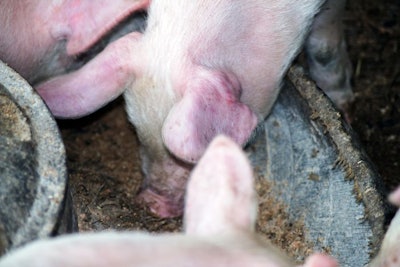
Legislators have decided to ban feeding growth-promoting antibiotics to all pigs, and they are trying to reduce even therapeutic use in order to protect human health.
Next, a ban was enacted on zinc oxide, a mineral that controls diarrhea in piglets, an ailment that plagues them because we wean them too early and without proper feeding methods to cater for this problem. This was done to protect soils from chlorosis so that we can continue raising our crops.
All these measures, misguided or not, were done not by producers, but by policymakers who decide what is good for us, the environment, and apparently the animals in question. Some might say it is up to us – nutritionists, vets, producers, etc. – to keep pigs healthy, productive and efficient, so we can keep enjoying pork chops at a reasonable price.
Viable alternatives needed
I was once told never to leave a job before you find a new one. I think this applies to most things in life and certainly in what we did with the ban on antibiotics and now zinc oxide – and who knows what will come next. We should not have banned these vital ingredients before finding viable alternatives.
We condemned the industry to look for alternatives while pigs suffered from low performance and low efficiency. Where one might excuse that as loss of profitability for the common good, how can we explain the lack of interest in the health of piglets now in order to protect the soil quality deterioration that will happen at the worst case scenario in 80 to 120 years from now?
I say we did not respect the welfare of piglets and we leave them to suffer from diarrhea because of a truly misguided notion that we should ban zinc oxide now. What is worse? Not having a toy to play with or die from uncontrollable diarrhea? How do we define welfare, after all, if basic needs are not met first? Have we made yet another terrible mistake?
We need more time, different policy
It can be said that we have been given ample warning and lead time (until 2022) to get rid of zinc oxide. This is simply not enough when we are being pressured at the same time to reduce use of therapeutic use of antibiotics that could help in the transition period. We need more time.
In fact, I would personally argue, we need a different policy, at least until we find a strong replacement for those ingredients that control diarrhea in weaned pigs. I would argue that we should allow a certain but efficient level of zinc oxide at the crucial 2-3 weeks post-weaning, while drastically reducing the amount of zinc (as a nutrient) in the final stages, where animals consume 75% of their feed. That is, reduce zinc in excreta (the desired outcome) but balance it out. Research exists that supports the notion pigs can do with less zinc in the growing-finishing period, so this is doable from a production point of view.
There is a problem, however, even with this proposal and this is why, I believe, policymakers decided to place a horizontal reduction on zinc and a ban on pharmacological levels of zinc oxide in particular. There is no way to “police” such system of zinc re-distribution, and the “honor” system has proven inadequate in most cases, as we all know very well. So, we are heading for another crisis in piglet health and welfare when zinc oxide is finally “outlawed.” Pigs will start scouring and dying again, and their welfare will be sacrificed for the good of the environment – of which, one can argue, they too are a significant part.
Not being a policymaker myself, I cannot even pretend to understand the balances and needs of the general good. But, I know as a nutritionist, and I believe my veterinarian colleagues will agree, and producers will applaud, that we need either more time or more resources to find an alternative to zinc oxide. There is still time to lobby for that, now that we have lost the battle over antibiotics. Let us not repeat the same mistake and ban a vital ingredient before we find a viable replacement. History buffs will tell us that we do not learn from our mistakes, and I think this is what will happen.
Re-education on diet formulation
Before closing, let me address an issue that I am sure this will bring up. Yes, we have a great number of diarrhea controlling products. Some work, some not so well, but they are out there in the market. So, if that is true, one can reasonably argue why wait for the ban on zinc oxide? Simply because some do not work as effectively, and (or) because their use requires a level of sophistication that is beyond current reach at the farm/feed mill level. We need more education, indeed, we need re-education on how to formulate diets without the good old antibiotics and zinc oxide. And, lamentably, we have lost the ability to research and educate the next generation of nutritionists to do just that: reinvent piglet nutrition.

















